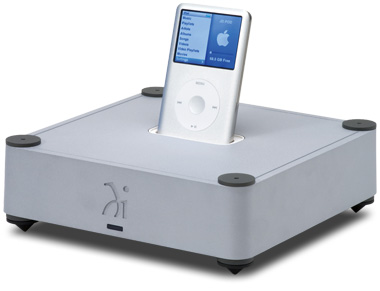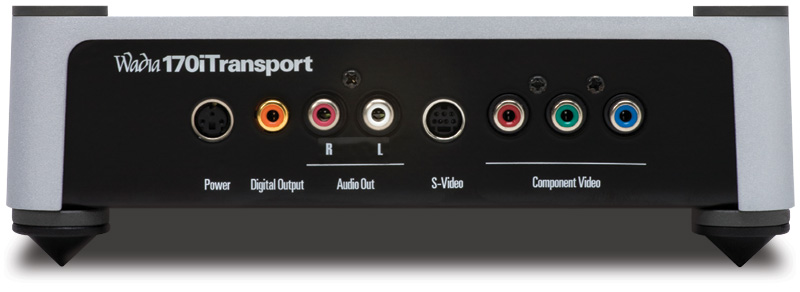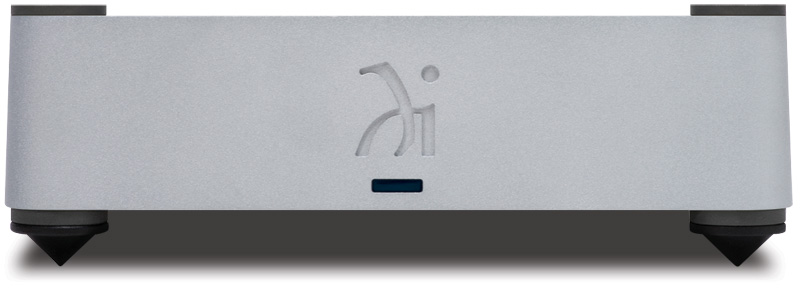 February 2009
Wadia 170iTransport Digital iPod Dock
 Most of the time, I'm quite
pleased to be assigned any and all kinds of audio equipment, but every so often something
comes along that seems completely uninteresting. Such was the case when I was asked to
write about an iPod dock -- an iPod dock! At the risk of sounding a little high and
mighty, I thought the assignment was some sort of joke, or maybe punishment for an unknown
misdemeanor. "Why are we reviewing an iPod dock," I asked. "What makes it
so special?" Most of the time, I'm quite
pleased to be assigned any and all kinds of audio equipment, but every so often something
comes along that seems completely uninteresting. Such was the case when I was asked to
write about an iPod dock -- an iPod dock! At the risk of sounding a little high and
mighty, I thought the assignment was some sort of joke, or maybe punishment for an unknown
misdemeanor. "Why are we reviewing an iPod dock," I asked. "What makes it
so special?"
"It’s made by Wadia."
"Oh. Well, in that case...."
From its inception in 1988, Wadia has built a
reputation as an innovator in the field of digital audio. Wadia knows digital well because
its entire focus is on reading and decoding digital source material. During its first 20
years, Wadia laid claim to a number of innovations or industry firsts, among them being
the first company to produce an outboard digital-to-analog converter, the first to
recognize jitter as a source of audible distortion, the first high-end CD player
competitive with expensive separates and, our focus here, the first company to provide
bit-perfect digital output from the iPod.
Of course, these innovations come at a price.
Wadia’s 270se CD transport, for example, commands $9950 USD, while its 581i CD player
breaks into five figures at $11,500. Combined, those two products are still shy of the
Series 9 DAC, which can be yours for 27,850 American greenbacks. With a pricey product
line like this it would be natural to expect Wadia’s 170iTransport iPod dock to sell
for quite a lot more than its $379 asking price.
So how does Wadia marry a low retail price with a
reputation as a high-end manufacturer? It’s obvious that there is no way the
170iTransport could be made alongside Wadia’s far more expensive siblings, and so the
dock is assembled overseas in order to keep production costs low. But low-cost assembly
doesn’t mean that Wadia abandoned its "house look" for the 170iTransport.
It shares the same solid, minimalist aluminum-sculpture look as its siblings, but the
170iTransport is made with aluminum castings rather than machined metal. The bottom and
back of the 170' are made from a single sheet of thin, black-painted aluminum and the
back-mounted connectors are nothing to write home about. The bright-white miniature remote
control is a nice touch, as is an included digital cable. With its inset Wadia logo,
aluminum upper body and pointed rubber feet, the 170iTransport won’t be mistaken for
garden variety iPod docks. Nor should it be, because this is one unique iPod accessory.
The Wadia 170iTransport is the only
Apple-authorized iPod dock that has been granted access to the iPod’s digital audio
stream before it reaches the player’s internal digital-to-analog converter.
Audiophiles have long felt that the iPod’s internal DAC is of poor quality and that
it severely limits the player’s analog potential. Of course, the only way around the
internal DAC is to, well, go around it. How Wadia scored its coup with Apple isn’t
known, but I wouldn’t be surprised to learn that Steve Jobs’ favorite CD player
comes from Michigan.
Due to its unprecedented access to the
iPod’s pure digital stream, the 170iTransport offers something no other dock can: a
digital output. The 170’ is not a digital-to-analog converter, and if it’s to be
used to its full potential it must be connected to an outboard DAC. The 170iTransport also
features analog outputs, but these offer a sound quality no different from those of any
other iPod dock because the digital-to-analog conversion takes place inside the iPod, not
the 170'. Buying a 170iTransport with the aim of using its analog outputs is kind of like
buying a Ferrari and fitting it with cheap snow tires. What’s the point of that?

Just because the 170’ has direct access to
digital data doesn’t mean that it outputs a perfect, high-quality signal to an
attached DAC. The unit has to work with whatever grade of file it is presented with, and
it’s reasonable to expect that the "garbage in/garbage out" principle
should come into play. But does it?
Files stored on the iPod in Apple Lossless or WAV
formats pass through the 170iTransport unchanged, and in such an instance it would serve
as a simple pass-through device. Of course, it’s the only simple pass-through of its
kind. What’s passed out of the 170’ is precisely the same as would be available
to a DAC connected to the computer that stores the original ripped CD. In this case the
iPod and Wadia 170' would serve as a complete stand-in for a music server, eliminating the
need to have such a computer close enough to an audio system to stay within USB
cable-length specifications.
Of course, most iPod owners care more about the
quantity of music on their players than the quality of the files, so the standard 128
kilobit per second (kbps) data rate of Apple’s standard AAC file format will be
presented to a 170iTransport far more often than should ever be permitted by law. These
files, once whole musical beings, are nothing more than a shadow of their former selves
when they enter the Wadia dock. Letting them out into the world wouldn’t do much for
Wadia’s reputation, so the company’s engineers planted a little surprise inside
the 170iTransport: reclocking, which is applied to all incoming data regardless of file
type.
Wadia’s digital masters couldn’t add
many features to the 170iTransport and still deliver it at an appealing price, so they
focused in on what really matters: sound quality. As mentioned, with lossless or WAV
(uncompressed) files, quality wouldn’t be an issue, but AAC files might well be a
mess. Upsampling wouldn’t make much sense with low-quality files, but reclocking
those files did. When the 170iTransport senses that it is receiving a compressed file, the
iPod’s clock signal is discarded and the unit’s internal circuitry inserts new
clock timing. The major benefit of this is what seems to be a considerable reduction in
jitter. Indeed, when listening to files ripped at AAC’s default 128kbps, the
170iTransport sounded consistently better than the same file played off my music-server
laptop. Of course the 170’ isn’t magic and it couldn’t make these files
sound as good as real high-quality files, but the improvement was impressive nonetheless
and would likely be good enough for casual listening or less discerning music lovers.
Fed proper files, I could barely distinguish
between WAV files played from my music server and files coming through the 170iTransport,
both into a Benchmark DAC1 Pre. It wasn’t just the sound of the instruments or the
bass punch, but even the special cues were almost as good from the Wadia as from my
laptop. My suspicion is that the only reason I could hear a difference is courtesy of a
Synergistic Research Tesla Tricon USB cable ($800), which seems much more adept at
relaying the digital signal to the Benchmark than the digital cable that is included with
the iTransport. Replacing the Tesla Tricon with a more garden variety Kimber USB cable
($60) did make the iPod and 170iTransport identical in sound to the laptop. Thanks to Mrs.
Smith for running the A/B test for me.

I realize the power I have over your audio buying
decisions (not), but in this case you need not rely solely on my positive opinion of
Wadia’s 170iTransport. Instead, take a look at what the company’s high-end peers
are doing with the 170’. At both the 2008 Rocky Mountain Audio Fest in Denver and CES
2009 in Las Vegas, many audio exhibits featured a 170iTransport as a digital source.
I’m not just talking about a few here and there, but an abundance of the things, most
connected to systems costing hundreds of times the unit’s price. Can there be a
greater compliment paid to an audio component than to have other high-end makers use it to
show off their own products? I’ll tell you this much: The Wadia 170iTransport was the
only $379 digital source anywhere near these megabuck systems.
Wadia must be congratulated not just on the
excellent performance of the 170iTransport, but also on its appreciation of a gap in the
marketplace and the skill with which it has filled it. It’s easy to picture the
170iTransport providing listening-session continuity between car and home system, a role
which it surely must fulfill in a great many homes around the world. And for those who
would love to own a Wadia 170iTransport but don’t own a DAC, the company will soon
have one matching the 170’ in appearance and, because it’ll be a Wadia DAC, most
surely in performance too.
...Colin Smith
colins@soundstage.com
Wadia 170iTransport
Price: $379 USD.
Warranty: One year parts and labor.Wadia
Digital
1556 Woodland Drive
Saline, MI 48176
Phone: (734) 786-9611
Fax: (734) 786-0163
E-mail: sales@wadia.com
Website: www.wadia.com |
|

